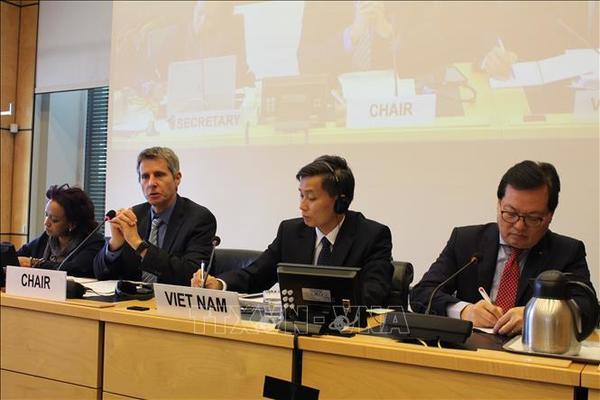|
||
|
|
The Vietnamese Prime Minister approved the plan to strengthen the implementation of the International Covenant on Civil and Political Rights (ICCPR), after Vietnam successfully defended the 3rd National Report on the implementation of the ICCPR at the dialogue session of the United Nations Human Rights Commission.
This shows Vietnam's commitment to the serious, consistent and comprehensive implementation of the policy of respecting and promoting human rights, which is highly appreciated internationally.
Deputy Minister of Justice Nguyen Khanh Ngoc - head of the Vietnamese delegation at the recent dialogue session - told the local press: The success of the recent dialogue session with the UN Human Rights Commission on the 3rd National Report on the implementation of the ICCPR was based on Vietnam’s remarkable efforts on performing comprehensive reforms, including legal, judicial and administrative reforms, to improve quality of services for the people, putting people at the center of policies and laws, creating favorable conditions for people to have a voice and to contribute to the development of the country and equitably enjoy socio-economic development results of the country.
After the dialogue session, the Ministry of Justice presided over and coordinated with other ministries and sectors to report to the Prime Minister for promulgating Decision No. 1252/QD-TTg dated September 26, 2019 on the approval of the Plan for strengthening effective implementation of the ICCPR Convention and the recommendations of the United Nations Human Rights Commission (hereinafter referred to as the Plan), showing Vietnam's commitment and determination in the implementation of the ICCPR and recommendations of the UN Human Rights Commission.
Decision No. 1252/QD-TTg sets out the main tasks and solutions, focusing on three groups of issues: firstly, continuing to internalize and complete the legal framework to implement the ICCPR; secondly, improving the effectiveness of the implementation of legal provisions on civil and political rights; and thirdly, propagating, disseminating, educating and training on the contents of the ICCPR.
Relevant ministries, agencies, and localities shall promulgate their own implementation plans or supplement, integrate these tasks into national plans, schemes, programs, strategies, and other mechanisms; report the implementation of the Plan to the Ministry of Justice, which will then report directly to the Prime Minister. The Ministry of Justice is working to soon issue its detailed plan on the implementation of each relevant field of work.
After what Vietnam has accomplished in recognizing, respecting and protecting human rights, including important contents in the 2013 Constitution on human rights, basic rights and obligations of citizens and the recent results on legal building and judicial reform, it is obvious that Vietnam has greater opportunities to effectively implement the ICCPR.
That is not to mention the opportunities brought about by the country’s extensive international integration process and the improvement of the capacity, qualifications, and awareness of officials and public servants. Among many of those opportunities, one of the biggest opportunities is that the country has been on the right track and its recent efforts have brought about positive results.
But it does not mean that everything will be favorable or there will be no difficulties and challenges for Vietnam in implementing this Convention in the near future since human rights issues can be analyzed, evaluated and exploited from many different angles, serving different purposes. Understanding this issue properly, setting it in the right context, circumstances and conditions of each country is always a challenge.
The international legal framework on human rights itself is always developing in line with the development of the international situation. Therefore, updating and improving understanding to keep up with the development of international law on human rights is a big challenge for Vietnam. The ICCPR Convention has been in existence for 53 years without any amendments, but official comments and explanations on the provisions of the Convention of the UN Human Rights Commission have made strong developments, accompanied by the increase in Vietnam's responsibilities and obligations.
With the special and central role of the ICCPR in the international human rights legal system, the implementation of this Convention has been and will always be an important content in policy, laws discussions at international, regional and national levels. Meanwhile, with the conditions, circumstances and development level of Vietnam, apart from the common difficulties and challenges, the challenges for Vietnam in implementing the Convention have been expressed in three main tasks that the Plan has pointed out: firstly, it is necessary to continue building and perfecting the legal system; the second is improving the effectiveness of law enforcement organization; and the third is to improve the effectiveness of propaganda, education, and training on the ICCPR.
Talking about opportunities and challenges of implementing the ICCPR is for us to understand correctly, to reach agreement on awareness to act together to effectively implement the Plan. However, opportunities and challenges are intertwined and heavily dependent on the way we approach and solve problems.
Noted by Hai Van
 The international community has recognized Vietnam’s outstanding efforts in performing comprehensive reforms to improve the quality of service for the people, putting people at the center of policies and laws.
The international community has recognized Vietnam’s outstanding efforts in performing comprehensive reforms to improve the quality of service for the people, putting people at the center of policies and laws.